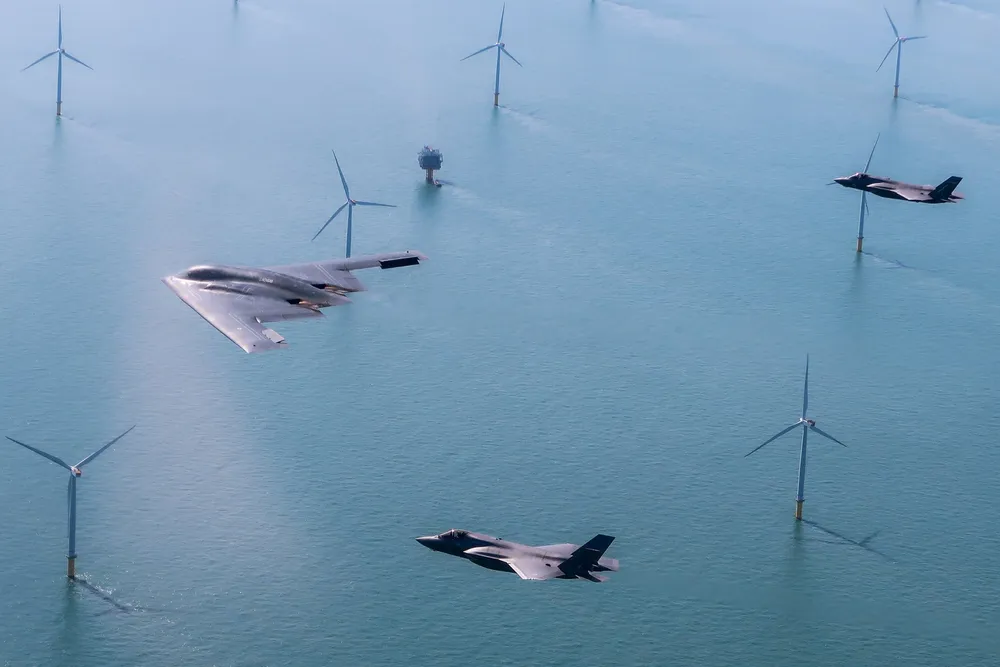UK military drops objection to RWE's Dogger Bank offshore wind projects
Offshore wind turbine interference with radar systems is industry as buildout gathers pace and military tensions rise in Europe

The UK Ministry of Defence has dropped its objections to RWE’s 3GW Dogger Bank South projects, having previously claimed that the turbines would have “unacceptable” impacts on its ability to defend British airspace.
The MoD said it has “reconsidered its position” regarding the impact that Dogger Bank South East and West could have on its radar installations, in a submission in the planning proceeding for the projects last week.
German utility RWE and Emirati renewables giant Masdar are developing the two Dogger Bank South projects — each with 1.5GW capacity — in the North Sea, about 120km away from the Staxton Wold air defence radar station operated by the UK Royal Air Force (RAF).
Wind turbine interference with radar systems is a growing issue in the offshore wind sector as more huge projects are deployed.
Radar systems ping out radio waves that bounce back off reflective turbine blades. While these systems can filter out known static objects, like buildings, that cause interference – moving turbine blades as long as football pitches are far more difficult.
The Dogger Bank South projects together envisage up to 200 turbines whose blade tips could stretch 396 metres above sea level.
The MoD previously said in the planning proceeding that these could have “detrimental effects on the operation of radar” at its Staxton Wold site, including the “desensitisation of radar in the vicinity of the turbines, and the creation of ‘false’ aircraft returns.”
The chance of it detecting aircraft flying over or near the turbines would therefore be “reduced,” it said, potentially affecting the RAF’s ability to “detect and deter aircraft” in UK airspace.
The MoD said its view was that the wind farm would cause “unacceptable and unmanageable interference” to its radar at Staxton Wold.
In a new draft development consent order (DCO), submitted as part of planning proceedings by lead development partner RWE last month, some areas of the Dogger Bank South West project which would have “unacceptable effects” on the radar capability of Staxton Wold were identified and guarantees were given that no turbine forming part of that project would be “permitted to rotate its rotor blades on its horizontal axis”.
UK energy secretary Ed Miliband, in consultation with he MoD, can give the final go-ahead by stating that he is satisfied that "appropriate mitigation will be implemented and maintained for the life of the authorised project” and that arrangements have been put in place with the MoD to ensure that the approved mitigation is implemented.
In its submission last week, the MoD said that it was now “content” that the wording agreed to in the draft DCO “provides a route through which appropriate mitigation could be secured.”
The MoD likewise said it was satisfied that the DCO contained wording leaving it “content that the potential for the development to degrade aviation safety for aircraft operating at low level” near the Dogger Bank South sites “would be mitigated.”
As such, the MoD said it is “content to withdraw its objection to this development.”
The MoD has for years now been soliciting technological solutions to the challenges turbines pose for its radar systems – including coating turbines in radar-absorbing materials and even placing sensors on them to turn them into the eyes and ears of the military.
The MoD is now working on coordinating these proposals through “Programme NJORD,” which aims to identify, procure and implement a mitigation solution to resolve military radar issues.